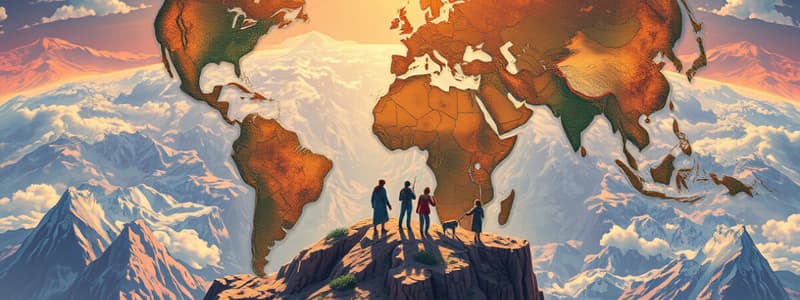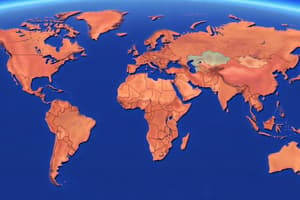Podcast
Questions and Answers
What is the balance of power?
What is the balance of power?
- Condition of roughly equal strength between opposing countries or alliances of countries (correct)
- A type of territorial boundary
- The ability of a state to govern itself
- A policy of ensuring one state does not dominate others
What is a boundary?
What is a boundary?
Invisible line that marks the extent of a state's territory
Define city-state.
Define city-state.
A sovereign state comprising a city and its immediate hinterland
What is colonialism?
What is colonialism?
What is a colony?
What is a colony?
What characterizes a compact state?
What characterizes a compact state?
Describe an elongated state.
Describe an elongated state.
What is a federal state?
What is a federal state?
What is a fragmented state?
What is a fragmented state?
Define frontier.
Define frontier.
What is gerrymandering?
What is gerrymandering?
Define imperialism.
Define imperialism.
What is a landlocked state?
What is a landlocked state?
What is a microstate?
What is a microstate?
What is a perforated state?
What is a perforated state?
Define prorupted state.
Define prorupted state.
What is sovereignty?
What is sovereignty?
Define state.
Define state.
What is a unitary state?
What is a unitary state?
What is decolonization?
What is decolonization?
What does the Brandt line represent?
What does the Brandt line represent?
Define enclave.
Define enclave.
What is an exclave?
What is an exclave?
What is the European Union?
What is the European Union?
What is a shatterbelt?
What is a shatterbelt?
Define shatterbelt theory.
Define shatterbelt theory.
What is the New World Order?
What is the New World Order?
Define the domino theory.
Define the domino theory.
What is supranationalism?
What is supranationalism?
What are supranational organizations?
What are supranational organizations?
Study Notes
Key Terms in Human Geography
-
Balance of Power: Indicates a situation of equal strength among nations or alliances, potentially preventing dominance by any single entity.
-
Boundary: Defined as an invisible line marking the extent of a state's territory, crucial for political and territorial integrity.
-
City-State: A self-governing entity that consists of a city and its surrounding areas, exemplifying sovereignty on a small scale.
-
Colonialism: Refers to the efforts of one nation to establish settlements and impose its control and cultural values on another territory.
-
Colony: A territory legally tied to a sovereign state rather than operating independently, often a result of colonialism.
-
Compact State: Characterized by a central point with boundaries that are roughly equidistant, promoting efficient governance and communication.
-
Elongated State: Describes a state with a long, narrow geographical shape, which may impact administration and transportation.
-
Federal State: An organizational structure where power is distributed among various local governments rather than being centralized.
-
Fragmented State: Consists of several separated pieces of territory, often creating challenges for governance and unity.
-
Frontier: An area between two states where neither maintains political control, acting as a buffer zone.
-
Gerrymandering: The manipulation of electoral district boundaries to favor a particular political party, impacting representation.
-
Imperialism: Involves extending control over territories already inhabited by indigenous groups, impacting cultural and political landscapes.
-
Landlocked State: A nation that does not have access to oceanic waterways, often affecting trade and economic growth.
-
Microstate: A very small sovereign state, often limited in resources but fully functional as a political unit.
-
Perforated State: A state that entirely surrounds another state, resulting in unique political and social dynamics.
-
Prorupted State: A predominantly compact state with a significant extension or protrusion that may serve specific strategic purposes.
-
Sovereignty: The capacity of a state to exercise independent control over its territory and internal affairs without external interference.
-
State: Defined as a political unit with an established government that has authority over its domestic and foreign matters.
-
Unitary State: A centralized model of governance where most actions and decisions are made by a core national government.
-
Decolonization: The process by which colonies gain independence, particularly notable in the period following World War II.
-
Brandt Line: A socio-economic division that separates wealthier regions from poorer countries, impacting global policy and development.
-
Enclave: A cultural minority group surrounded by a dominant culture, leading to unique social and political interactions.
-
Exclave: A portion of sovereign territory that is geographically separated from the main area of the state, posing administrative challenges.
-
European Union: A supranational entity formed in 2007 to facilitate cooperation in trade, borders, monetary policy, and more, resembling a federal structure.
-
Shatterbelt: Areas vulnerable to external pressures and conflicts, often marked by cultural and political fragmentation.
-
Shatterbelt Theory: Cohen's prediction that conflicts would emerge in geographically strategic regions during the Cold War era.
-
New World Order: Post-Cold War ideological framework envisioning a cooperative global environment without dominance by superpower competition.
-
Domino Theory: A Cold War doctrine suggesting that the fall of one nation to communism would lead to the spread of communism to neighboring states.
-
Supranationalism: The cooperative alignment of sovereign states working together for common objectives, often in trade or policy.
-
Supranational Organizations: Entities formed to promote cooperation through trade alliances, focusing on shared goals among member states.
Studying That Suits You
Use AI to generate personalized quizzes and flashcards to suit your learning preferences.
Description
Test your knowledge with these flashcards covering key terms from Chapter 8 of AP Human Geography. Each card provides a term and its definition, helping you master concepts such as balance of power, boundaries, and city-states. Perfect for revision and deeper understanding of geopolitical structures.




